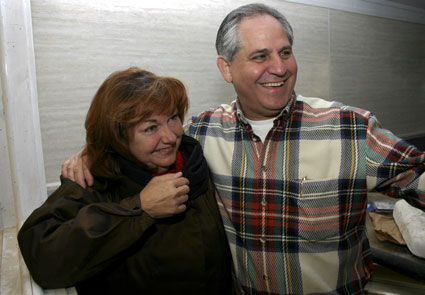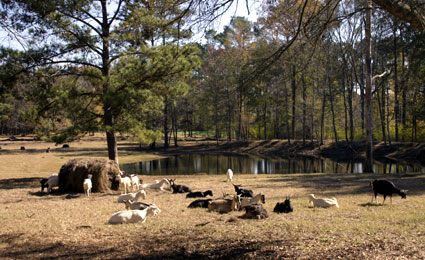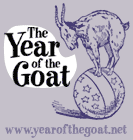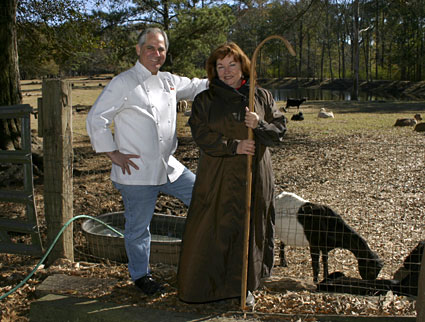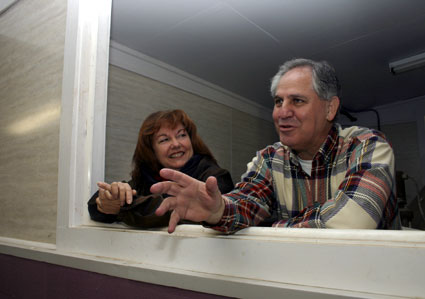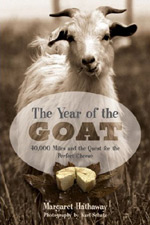Due to Chef Folse's great enthusiasm for the subject of Louisiana cheese making, we barely needed to ask questions and at times just listened, enraptured. What follows is the entire transcript of our interview.
YotG: So tell us a little about your cheese making. Are we witnessing the beginning of this process?
John Folse: This started up about two years ago. The funny thing is to hear you say that we're at the beginning--we're way away from the beginning. This is like we've just landed on the Moon. When I came out here the first time, there was nothing except a little house and a bunch of goats running around. And I said, gee, where is your milking parlor? Where is your shed? And she said, "We're going to get all of that, and I really need to build the herd. I need about 200 head." And I said, Okay, well we're a ways off then. But we started the talking process, and I said great, maybe six months? And then six months went by and a slab was starting to get strung out, not even poured. But I came to the realization that if I'm going to get really good quality goat milk, I'm going to have to wait. Because this isn't a fast project, this is going to be a project of a lot of love, a lot of care, and it's going to take its time. It's going to come at its own pace. I'm an entrepreneur. I have food manufacturing, I have restaurants, I have catering, and I have bakeries and cheese companies. In everything, we think in terms of entrepreneurship, you know, get it done, get it done. But you come to realize that it's not that way on the farm. Goats get sick and everything stops. And then she's got to spend the night with the goat to make sure it's okay. And then you start to see that and to experience it, and you realize that gee, I'm going to get some great milk here, and this is going to be a great project. So a year went by, and then a year and a half, going on two. And things started to evolve and the milking parlor was put in, and things are really coming along well. Now I know that we're not that far away. Now, that six months that we talked about when we started is in sight.
YotG: It seems like it's been quite a learning process.
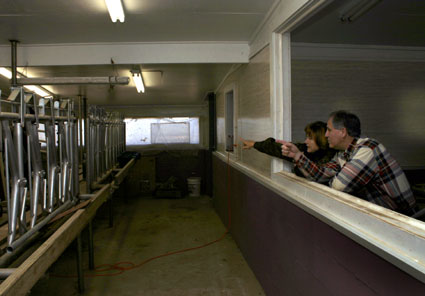 |
| McDonald shows Chef Folse the milking parlor set-up - enlarge photo |
JF: It's been nice to watch, since I'm not from the dairy business. I grew up on a sugar plantation and my family's been in sugar production for years and years. I'm the only one in my family in the restaurant business. I have a huge passion for food and Louisiana, especially Creole and Cajun cuisine. Coming to know that cheese was such a big part of that cuisine, and being able to be a part of resurrecting that, as well as being a source of revenue for a place like this has been great. I've probably been the one who's had to learn the most. You're fooling with Mother Nature here. It's a different thing, it's not like going to buy a piece of stainless steel machinery, hooking it up, and you're in business. It's absolutely, totally different. I mean, you're fooling with the mind of the dairy owner, and the passion of the dairy owner with goats (laughter). And it's a relationship, really, a relationship that you don't find with metal. That's what's nice out here. I don't come out here that often, but every time I come I say, wow! That's new since I was here last!
YotG: Can you tell us about how your partnership works? How are you all helping each other at this point?
JF: I called one day and said, you know, why didn't I think about this? I have refrigeration people on staff, air conditioning and carpenters and electricians on staff, and maybe I can send them over and let them do some work. Maybe we'll trade it out in milk or something like that, but we're going to be a partnership anyway, so why not? My refrigeration man came out and kind of tinkered around and he came to know how to work on milk baths, which is a good thing. It's strange to think that I'm sending my refrigeration man out of New Orleans, who works in my manufacturing plant, to come over here. His first question was, "What in the hell is John getting involved in?"
Cindi McDonald: I think he was inundated. On that fence there, a latch had loosened and it had let about forty goats out into the yard when he arrived, and he was like, "There are goats everywhere!" We were trying to get them out of the way so they wouldn't jump on his truck. (Laughter)
JF: Hopefully in mid-Spring, we'll start getting our milk, and the good news is that we already have three or four really nice triple creams that we've R and D'ed... because we were able to get some milk from here last year.
CM: The local Grade A inspector knew that John had to have milk to work with, and that he wasn't marketing it, and so we were able to do that, which was really nice. We've got some people down here who are willing to work with us.
YotG: People here must be pleased that you're spreading the word about Louisiana cheeses. Can you tell us a little bit about the history of cheeses in this area?
JF: While we were researching the new book, we were thinking about cheese and what was its place in Creole cuisine in the seventeen and eighteen hundreds, we discovered Creole Cream Cheese, which is one of the first cheeses out of my plant. It's a cow's milk cheese, created in France, and then brought here with the French when they settled. It was huge here until the 1980s, when the FDA came in and said that dairies cannot produce cheese in the same plant they process fluid milk. You either have to do cheese, or you have to do milk, and it ended up cutting out the cheese making. Here was this real icon cheese, Creole Cream Cheese, that had been here for a couple hundred years, that all of a sudden just disappeared over night. Historically we saw the significance of it, so when we built the plant, I said let's just move out right away with the Creole Cream Cheese. So we did, and it went into all the stores, and it gave us time to start here. As much as I wanted the goat milk, I didn't realize at the time that the greatest blessing was not having it. Because it allowed us to move out into the national marketplace and establish ourselves as a quality cheese maker. We've developed a market for our product, in a marketplace that is now seeking new cheese. Then, when we come out with our goat cheese, the day we come out with it, every bit of it is sold and they're just clamoring for it. They want the triple creams, and they want the aged, and some of the fresh, but they don't want the same old thing. They want some exciting things. And they say, "New Orleans, that's got to be exciting!" So that two years, what originally looked like "Oh my God, when are we going to get our cheese?" Now, in retrospect, allowed us to develop not only a market, but we came to understand cheese better, to understand cheese making technique better. We were able to take courses, and we were able to build our facility a little bit better. And in the last year I hired two Bulgarian cheese makers who immigrated here.
YotG: We saw that on you web site and wondered how did you find them?
JF: Just tenacity.
CM: He's a vigorous man in pursuit of cheese! (Laughter)
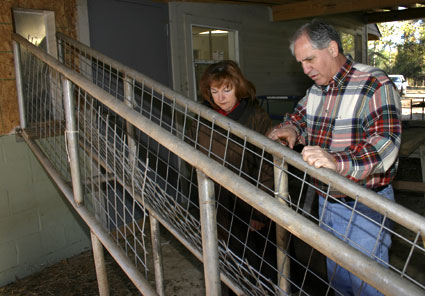 |
| McDonald and Chef Folse inspect the custom chute outside the milking parlor - enlarge photo |
JF: I think that's what it is. If you're really passionate--I keep using that word because I think that's all that matters, passion is all that matters--I think if you're really really serious about what you're doing, you're going to totally engulf yourself in it. And in the process, you instill the passion in other people. When I started asking cheese connoisseurs what they were looking for, they said they were looking for a great American feta. And where does feta come from? I'd gone to LSU and discovered there was a guy working on his PhD from Bulgaria, and his parents were trying to immigrate here. And I thought, ahh, great. So his parents move over and we get them a house. They speak no English, but this father and mother have been in the cheese industry in Bulgaria, and the father has personally run the largest cheese plant in the Soviet block. The largest one. So they come over, we give them a house, and they decide to stay here and get their citizenship through a lottery, and all they want to do is make cheese. The father has learned one sentence, he says, "America big country--cheese much money." And I say, in time, in time. I've come to learn everything in time. So here he is, he's an expert at feta, he's an expert at some of the hard cheeses, all goat and sheep, he's got great knowledge of all these different cheeses, and as bad as he wants to get into making the cheese, I say no, you've got to practice your English. I told him when you and I can have one good conversation: cheese.
CM: And in the meantime, he's biding time for my girls to have their babies.
JF: That's true, the time has worked out absolutely perfect. And now we're building a new food plant, which allows us to triple the size of the dairy and be able to do butters and ice creams. We're already into ice creams. Just cow right now, but we're going to do goat, and we're going to do goat butter, which is fabulous. I love goat butter. So we're looking for great things from under these pretty trees. I think our partnership will evolve, and come up with some new and exciting things because I need milk. I think here's a match made in heaven: you have a great goat dairy, and you have someone with a lot of passion for quality cheese making, and the two of them come together. Normally it's not like that because, as you know, when you go to a typical goat dairy they're trying to manage the animals and the system and the accounting and making the cheese, and there are a lot of things going on and they're doing a great job at little pieces of a lot of things. But here might be a new look at American cheese making, where we don't all have to do everything. She doesn't necessarily have to make cheese, and I don't need to get into the dairy business. As long as we have quality operators, who bring great milk, and they're our only source, and we're their guarantee for all their production. That's a great feeling, to know you get up in the morning and you don't have to worry about bottling it, you don't have to worry about any of it. We come along, pick it up, and off we go.
YotG: How did you go about calculating how much milk you're going to need?
JF: Well I guess everybody approaches that equation differently. I approach it very simply from a success quotient. I go in saying, if we do it, we're going to be successful at it, so what's the biggest vat I can get? And that's what I did. I went in and bought a five hundred gallon vat, and as they were installing it, I said, that's not big enough. And I said I need another vat, so I bought a fifteen hundred gallon vat. So I had two thousand gallons. Somebody said, "What the hell are you going to do with all these vats?" I said, this isn't enough. And they said, "Who are you selling to?" And I said, nobody, yet. But it's true, now those vats are full, and I haven't brought in my goat milk yet. I'm too small, and I've only been doing cheese for two years. I met this fantastic nun, and maybe you all know who I'm talking about?
YotG: Mother Noella Marcellino, the cheese making nun in Connecticut?
JF: Well she became a great friend of mine. When I brought my cheese to her, I was standing in line behind about twenty people, waiting to have my cheese evaluated. And you can imagine just the fear of that because here I am, I don't know a damn thing about making cheese. I'm new at it. And I'm taking this triple cream up there like the Holy Grail, and I'm bringing it up to the table, and she's got her microscopes and there are all these cheese makers around. And she's asking how long they've been in the business, and they say, "Sixteen years" or "Twenty years," or "Oh, my grandfather started the business," and I'm thinking, man do I really want to show this cheese? So we get up to the table and I give it to her and she looks at it, and she cuts into it, and she says "Do you mind if I taste?" And then she says, "Oh my God! How long has your family been in cheese making?" And I said, well, we got in about a year ago. And she says, "You've just started?" And she looks around like this (peers around, conspiratorially) and says, "I think this is just about the best cheese here. This is incredible cheese." And she starts dissecting it and then we sat down and we had this real great kinship, and she said this is really magnificent, magnificent cheese. So when you ask that question, how much do you need? I know that this dairy is about half the size that I need, but I also know that if I get enough milk to make just one triple cream, or if I make one aged cheese, that's going to be fine. That's going to be enough, because you can't push, otherwise you'll get disaster. I learned that early on. People who do this every day have such a love for these animals. These animals come first. It's not about the milk. The milk is a byproduct of what they're doing here. You have to bring your ambition into their sphere, and then you're going to have a good relationship. I'm not a patient man. I move a lot of things quickly. But I've been super patient here, because I know that this is my success. I'm not her success, she's mine. And together we're going to be good partners.
YotG: So our last question, you cooked for the Pope? What was that like? What do you serve the Pope?
JF: Well, unfortunately, I didn't serve him cheese. The Pope dinner in Rome was interesting because when the Pope was coming to New Orleans in the late eighties to do an event in the city, I was asked to do a special dinner for him, and I decided to create a dinner with foods of the seven Creole nations, since he represents all of those people. I had it all well planned, but for whatever reason, our dinner kind of got pushed off to the side. But the Bishop of Baton Rouge said, "We'll redo that dinner at some point." So about two years later I got a call from the Diocese of Baton Rouge. Bishop Stanley Ott called and said, "Remember we were talking about that dinner with the Pope? How would you like to do it?" I said I'd love to do it, when is he coming? And he said, "He's not, you're going to Rome." So I went to Rome. Every five years all of the bishops of the world have to go to the Vatican for a meeting with the Holy Father to get all of their instructions for the next five years, and it was on this occasion that they asked that I come over and do the dinner. So I did the dinner for the Conclave of Bishops there, and the day after had a private audience at the home of the Pope, not in Rome, but at Castel Gondolfo, which is his castle in the town of Gondolfo, about an hour out of Rome, overlooking the city. When you're sitting in Gondolfo, you're looking down the mountain into St. Peter's. You can see the dome. It's an hour away, but you can see it. They built that place for the Pope in the beginning of the Renaissance, and they chose that area because it was in a vineyard and the Pope could always have his eyes on St. Peters. So that's where they brought me, and I had a private Mass in the morning, and then did a breakfast with him, and then had an audience with him for a couple of hours.
YotG: What do you talk about with the Pope?
JF: You know, that was the question I asked when I got there. But the Cardinal who was his secretary, Cardinal Stanislaus from Poland, said that's one thing you don't have to worry about, he'll carry it. And he did, he talked to me about cooking, and he talked about sausage making, and he talked about him being a great hunter, he talked about fishing being one of his first loves. He said that in the past he loved to cook, but of course he didn't get to cook much now. I did a seven, eight course meal the night before, but the greatest thing was to be able to spend three hours at Gondolfo, which is very rare. I mean, it is very rare. I would have never dreamed that in my lifetime. But it just happened. To be sitting in his home, on top of the mountain at Gondolfo, and to be looking at him saying Mass, and there's only a few people there... and then to sit down and have breakfast with him, was just unbelievable. It was a very interesting part of my life.
YotG: Well, we read that and we thought, you make cheese and you've met the Pope? You're the only goat person we know who's had an audience with the Holy Father!
